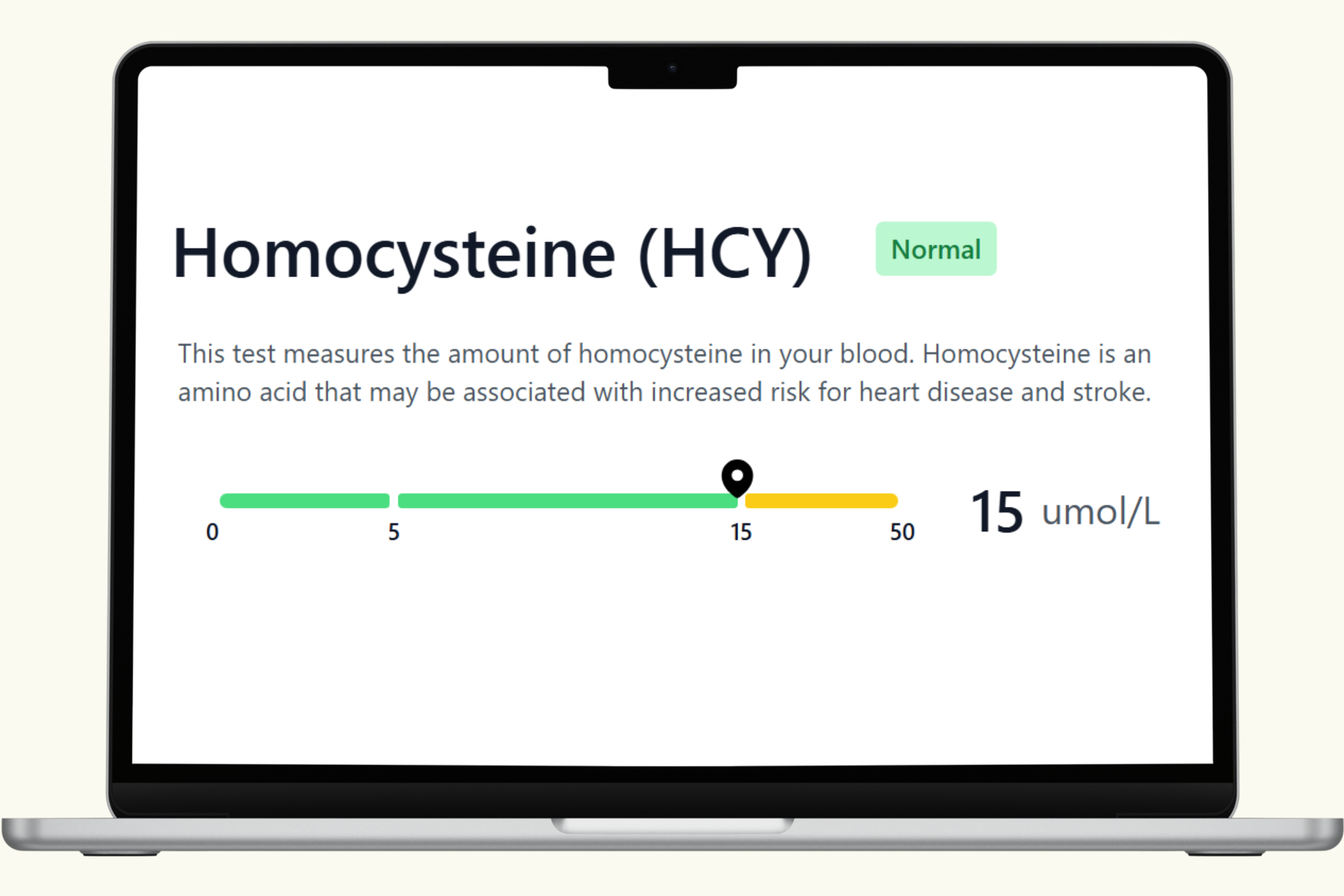Homocysteine Blood Test: A Key Marker of Methylation, Nutrition, and Cardiovascular Health
The Homocysteine Blood Test, included in the PlexusDx Nutrition Deficiency Blood Test, measures levels of homocysteine, an amino acid produced from methionine metabolism. Under normal conditions, the body uses B vitamins—particularly vitamin B12, folate (B9), and vitamin B6—to recycle or break down homocysteine efficiently, keeping blood levels low. When this process is disrupted, homocysteine builds up in the bloodstream, signaling potential nutrient deficiencies or metabolic imbalances. Elevated levels have been associated with cardiovascular disease, cognitive decline, and other health issues, making this test an essential tool for understanding both nutrient balance and long-term wellness.
What Is Homocysteine?
Homocysteine is an intermediate amino acid formed when the body processes methionine, a protein-building block found in many foods. Normally, homocysteine is recycled back into methionine or converted into cysteine, a process that requires adequate amounts of folate, vitamin B12, and vitamin B6. If any of these nutrients are lacking, homocysteine metabolism slows, and levels rise.
Because of its reliance on key vitamins, homocysteine serves as both a marker of nutrient status and a reflection of methylation efficiency—a critical biochemical process involved in DNA repair, neurotransmitter balance, and detoxification.
Why Is the Homocysteine Blood Test Important?
The Homocysteine Blood Test provides valuable information for several reasons:
- Nutrient status: Elevated homocysteine can reveal deficiencies in folate, vitamin B12, or vitamin B6 before more serious health problems develop.
- Cardiovascular health: High homocysteine levels have been linked to arterial stiffness, endothelial dysfunction, and an increased risk of heart disease and stroke.
- Cognitive health: Elevated homocysteine is associated with faster rates of brain atrophy, impaired memory, and greater risk of cognitive decline.
- Methylation efficiency: Since methylation underlies DNA synthesis, neurotransmitter regulation, and detoxification, homocysteine reflects how well this pathway is functioning.
- Overall metabolic health: Monitoring homocysteine can uncover subtle imbalances that contribute to long-term health risks.
Homocysteine Blood Test Reference Ranges
Homocysteine levels are typically measured in micromoles per liter (µmol/L). Commonly accepted ranges include:
- Standard reference range: 5 – 15 µmol/L
- Functional/optimal range: 6 – 8 µmol/L (associated with better cardiovascular and cognitive outcomes)
- Mildly elevated: 15 – 30 µmol/L
- Moderately elevated: 30 – 100 µmol/L
- Severely elevated: > 100 µmol/L
Even values on the higher end of the “normal” range (10–15 µmol/L) may still indicate increased risk, which is why functional medicine practitioners often aim for a narrower optimal range.
What Causes Elevated Homocysteine?
High homocysteine levels, known as hyperhomocysteinemia, can be caused by several factors:
- Nutrient deficiencies: Low intake or poor absorption of folate, vitamin B12, or vitamin B6.
- Genetic factors: Variants in genes such as MTHFR may reduce methylation efficiency and elevate homocysteine.
- Aging: Older adults often experience reduced absorption of B vitamins, contributing to higher homocysteine.
- Medical conditions: Kidney disease, thyroid dysfunction, or certain autoimmune disorders may impair homocysteine clearance.
- Lifestyle factors: Smoking, high alcohol intake, poor diet, and sedentary behavior can all raise homocysteine.
Health Risks of High Homocysteine
Persistently elevated homocysteine levels have been associated with a variety of health risks, including:
- Cardiovascular disease: Increased risk of heart attack, stroke, and peripheral artery disease.
- Cognitive decline: Higher likelihood of memory loss, dementia, and Alzheimer’s disease.
- Pregnancy complications: Increased risk of neural tube defects, preeclampsia, and recurrent pregnancy loss.
- Bone health: Links with osteoporosis and higher fracture risk.
Because these risks often develop silently over time, early detection of elevated homocysteine is critical for prevention.
How to Lower Homocysteine Levels
Fortunately, elevated homocysteine is often correctable through nutrition and lifestyle. Strategies include:
- Increasing intake of folate-rich foods (leafy greens, legumes, citrus, and fortified grains).
- Consuming adequate vitamin B12 from animal products (meat, fish, dairy, eggs) or supplements if following a plant-based diet.
- Including vitamin B6 sources such as poultry, bananas, and whole grains.
- Supporting methylation with additional nutrients like choline, betaine, and riboflavin.
- Addressing lifestyle factors by quitting smoking, reducing alcohol intake, exercising regularly, and managing stress.
At-Home Homocysteine Testing with PlexusDx
With the PlexusDx Nutrition Deficiency Blood Test, you can measure homocysteine easily from home using a dried blood spot collection on an ADX card. This method is:
- Convenient – No need to schedule a lab appointment.
- Accurate – Provides clinically reliable measurement of homocysteine.
- Actionable – Results highlight nutrient imbalances that can be corrected with diet and supplements.
Who Should Consider a Homocysteine Blood Test?
This test is valuable for individuals who:
- Experience fatigue, memory issues, or brain fog
- Have a family history of heart disease or stroke
- Are at risk for nutrient deficiencies due to restricted diets or absorption problems
- Are pregnant or planning pregnancy
- Want to assess methylation efficiency and metabolic health
- Seek preventive screening for cardiovascular and cognitive wellness
Take Charge of Your Nutritional Health with PlexusDx
The Homocysteine Blood Test, part of the PlexusDx Nutrition Deficiency Blood Test, provides deep insight into one of the body’s most important metabolic pathways. By identifying hidden B vitamin deficiencies and methylation imbalances, it empowers you to take proactive steps toward better cardiovascular, cognitive, and overall health. With simple at-home collection and fast, reliable results, PlexusDx makes it easier than ever to optimize your wellness.
Order your PlexusDx Nutrition Deficiency Blood Test today and discover how homocysteine levels can reveal critical insights into your nutrient balance and long-term health.

Share:
Hematocrit Blood Test
Vitamin B12 Blood Test